- Home
- Juliet Marillier
Wildwood Dancing Page 29
Wildwood Dancing Read online
Page 29
“I can’t help you with that,” Drǎguţa said briskly. “Now are we done here? It’s not my habit to answer so many questions. I hope you don’t have any more; I doubt if I’m up to it.”
I swallowed a further plea for help. I had not forgotten who she was, or what she could do.
“It’s for you to sort out, Jena,” the witch said, her tone not unfriendly. “You are, in fact, highly capable and full of goodwill. You can do it.” The white snake slid up her arm to twine around her shoulders. She picked up her staff, which had been lying in the bushes. “Goodbye, Jena,” she said. “Hurry back. Your sisters are getting cold.”
“Goodbye,” I said as she slipped away, vanishing within moments. “Thank you for giving me the truth.”
There was a diminishing cackle, high-pitched and scornful, then silence.
At the top of the winding stair my sisters were waiting, white-faced and silent. Paula had the lantern that we had left ready at the foot of the stairs when we came down, and Stela was carrying the bundle. Tati was sitting on the ground with her back against the portal, her eyes shut.
“She says she’s not coming,” said Iulia, who was crouched by Tati with a hand on her shoulder.
“Tati!” I said sharply, kneeling down and touching my sister’s wan cheek. “Tati, wake up! Put your hand on the door—come on!”
“Not going … must wait … Sorrow …,” she muttered.
“Tati,” said Paula, “we can’t get home unless you help us. We’ll all be trapped here in the middle. Come on! Sorrow’s going to be away for a whole month.” I saw in her face the unspoken thought: And probably far longer—that’s if he ever gets back. The quest had seemed formidable to me, and I had never even heard of Ain Jalut or Zaradok.
Tati opened her eyes. “I’m not going,” she whispered. “I’m waiting for him here.”
It sounded like nonsense. But something deep inside me had changed tonight. Now I could understand so well what she was feeling: the longing, the grief, the fragile hope. “Tati,” I said, “if you truly love Sorrow and he loves you, you need to do what Ileana asked you to do: to keep faith until he achieves the quest. Let us go home, and we’ll help you get through the wait until next Full Moon. Remember what you said: love and loyalty, truth and trust? You can trust your family.”
“You really believe that?” she asked me in a wisp of a voice. “That love will make it right?”
I longed for the certainty that would let me speak as Tati had to Ileana, pleading Sorrow’s case and her own. If only I could believe that love must triumph over all adversity. But my head was full of doubts. “Of course I do,” I said, wishing with all my heart that it was not a lie.
“Come on, then,” whispered Tati, kneeling and placing her hand on the stones. We set ours beside it so the five of us touched the portal together. It slid open, and we entered our bedchamber. There, both Ioan and Marta lay sleeping, exactly where we had left them. Our last visit to the Other Kingdom was over.
We heard the bolt slide open soon after dawn, and Cezar’s voice. “Where’s my man?” he demanded. “What’s he got for me?” He was in the doorway.
We had changed back into our day clothes; our dancing finery was neatly packed away. I had unfastened the inner bolt. Stela had slept for a little, but the rest of us had been too nervous to rest.
“Ioan’s still asleep,” I said as calmly as I could. “So’s Marta. It’s very early.”
“Wake him.” Cezar was keyed up, his hands clenched into fists. His tone shocked me. “I need his account now.”
“I’m not your servant, Cezar.” Something had made me strong this morning. Perhaps it was the knowledge of what he had done, all those years ago. “I’m taking my sisters down to breakfast. I won’t be treated as some kind of lackey in my own home.”
“Wake him!” He lifted his hand and struck me; my cheek burned. I heard my sisters’ horrified gasps behind me.
“You can’t do that!” protested Iulia.
“Excuse me.” My voice was not calm now, but shaking. I walked past Cezar, palm to my face. The others followed me without a word. As we made our way down the stairs, I could hear him shouting at Ioan, “Wake up, man! What’s the matter with you?”
It was a difficult day. Without making any kind of decision, we sisters did not say anything to Florica or Petru, or to Cezar, about Costi’s reappearance, though I had told the others after we came home that I had been terribly wrong. It was true: Gogu and Costi were one and the same. I feared to tell Cezar the truth. I did not know how he would respond, with anger and suspicion or with love and relief that the adored brother whose death he bore on his conscience was, after all, alive and well. I did not know what Costi would do, how he would manage his return. Would people know him? Or would they be like me—wary and doubtful, unable to trust? I should have known him better than anyone; he’d been my constant companion since I was six years old.
My face hurt. In the mirror, I could see a livid bruise flowering across my cheek, the imprint of my cousin’s angry hand. I was sad, guilty, and afraid.
There was a row. I heard Cezar yelling at Ioan; clearly he was throwing him out of the house. Marta made a hasty departure for home, accompanied by one of the guards. Then Cezar strode into the kitchen, where we were sitting in silence over our breakfast, none of us able to eat much. He confronted me, hands on hips, his broad features flushed red with anger. “You used something, didn’t you? Some kind of potion, something to send them to sleep? Don’t deny it, Jena, I know your tricks! Answer me! What did you do?”
“Leave her alone!” Tati protested, half rising, her hand on the table for support.
“Master Cezar—” began Florica.
“Enough!” His voice was thunderous. “Jena, tell the truth!”
“I have nothing to say to you,” I said, shivering. “Only that if Uncle Nicolae could see you now, he would be bitterly ashamed of you.”
“How dare you—”
“Don’t even think of hitting me again,” I said. “I have nothing to tell you.”
“Then we’ll see whether your sisters do,” Cezar said. “Not now—I have business to attend to across the valley. I’ll be home before supper, and I’ll be speaking to each of you on your own before you go to bed tonight. If you don’t like the sound of that, Jena, you know how to prevent it. You need only tell me the truth.”
The day seemed interminable. Tati went back to bed and lay there, very still; I could not tell whether she was awake or asleep. Iulia helped Florica with some washing. Up in our chamber, Stela fretted, unable to settle down to anything. She flounced around the room, kicking at the furniture and disarranging things on shelves. When she started to fiddle with Gogu’s jug and bowl, I snapped at her.
“Stop that, Stela!”
Her lower lip trembled.
“Stela?” Paula put aside the book she had been trying to read and went over to her little storage chest. “You remember how you asked me to teach you to play chess? Shall we do it now?”
“Thank you,” I said as Stela began to unpack the chessmen from their bag while Paula unfolded the hinged board that was one of her prized possessions.
“That’s all right,” Paula said. “Jena, what do you think Costi will do? Will he come here?”
“He has to, eventually. He must confront Cezar. I suppose he might need time to prove his identity. Maybe I should have told Cezar what happened. But it sounds so mad: Your brother’s alive—he was a frog all those years.” I had not told my sisters about Cezar’s choice. I had not explained how Drǎguţa’s gift had turned our cousin’s life gradually to the dark.
“I can’t believe Cezar hit you,” Paula said in a small voice. “Jena, if he insists on talking to us one by one …”
“Don’t worry,” I said with false confidence. “I won’t let that happen.” But my stomach was heavy with dread, and my bruise throbbed as I remembered the look in Cezar’s eyes. It was the look of a man who believes the whole world is against him�
�of a man who will do anything to change the ill hand he thinks fate has dealt him. And although part of me shrank from seeing Costi again, for the memory of his set face and wounded eyes filled me with guilt, another part of me was wishing, wishing above anything, that he would come.
* * *
Being cooped up indoors was driving me crazy. Toward the end of the afternoon, I seized a moment when there were no guards around and slipped out, bucket in hand, to give the chickens their mash. The light was fading and the shadowy courtyard was deserted, save for a solitary figure standing stock-still, right in the center. It was an old woman dressed in black, with a basket over her arm. The basket was empty. I felt a prickling sensation all over my skin. A moment later I heard a horse’s hooves approaching along the path that skirted the woods. Cezar was back.
“Go,” I muttered, setting down my bucket and hurrying over to the old woman. “Go quickly!”
The crone made no attempt to move away. She had shed the tiny uncanny form that I was accustomed to, but I had known her instantly. She looked just as she had long ago, when three children had ventured to a forbidden place to play at kings and queens. The old woman grinned at me, and her little pointed teeth confirmed her identity.
“Go!” I urged her again. “Cezar’s coming!” Images of the hunt were in my mind: those men with their iron implements, their tight jaws, and their eyes half angry, half terrified.
“I know,” said Drǎguţa calmly.
And it was too late. He was there, riding into the courtyard. He dismounted by my side, glaring at the unexpected visitor. “Be off with you!” he said. “If you’re expecting handouts, you’ve come to the wrong place. We’ve nothing for beggars at Piscul Dracului.”
“Not at all, young man,” said the crone, gazing up into his scowling face. “It’s my turn to bestow largesse. I have something for you.”
Cezar opened his mouth to speak, then shut it again as Costi stepped out from the shadows by the hen coop to walk across to us. His dark curls had been cropped short and he was freshly shaven. He wore a plain white shirt, a waistcoat embroidered with ivy twists, and dark green trousers with riding boots. He looked just as wonderful as he had in my dreams. The green eyes were cool and the mobile mouth unsmiling as he came up to me. Over his arm was my cloak.
“I think this is yours,” he said politely, holding the garment out to me.
Cezar froze, staring at him. I took the cloak but said nothing—for the moment, I had no words. I had known that Costi would come back, but not like this, not suddenly, without any warning, and with the witch of the wood beside him.
“Jena,” said Cezar in a strangled whisper, “who are these people? What are they doing here?” His eyes went from Costi to Drǎguţa and back again; he looked as if he were caught in a terrifying dream.
“I’m your brother, Cezar,” Costi said. His voice was unsteady; I saw in his face that he was half expecting the same rebuff I had given him last night, and dreading it. There was anger there, certainly, but it was not as strong as the love and the desperate hope in his eyes. “Maybe you’ve forgotten me. It’s a long time since that day by Tǎul Ielelor when we gave up our most treasured possessions.”
I found my voice. “It’s true,” I said. “He didn’t die. He was bewitched into another form until he came back to himself not long ago. Drǎguţa didn’t drown him, she saved him. She made him into a frog. He’s been here all these years, Cezar. He was Gogu.”
“The frog,” Cezar said blankly. “No. No, it can’t be. It’s nonsense. Are you saying … Are you telling me—? I don’t believe you. You’re not my brother, you can’t be. Costi died. I saw it.” He was looking at the witch now, and I saw him open his mouth again to call out, to summon the guards and have her seized.
“No—” I began, but Drǎguţa gave the tiniest shake of her head. I fell silent. In her eyes I saw that the guards would not hear my cousin shout, that nobody would come until her business here was done. It was as if Piscul Dracului and all the woods around it were frozen while the four of us played the game to its conclusion in the quiet courtyard.
“This is your doing, Jena!” Cezar blustered. “You encouraged this—this thing—right onto our doorstep! You harbored that wretched slimy creature, you lied and cheated and used every trick you could think of to stop me from finding out the truth about your escapades. You’ve probably been crossing over into the dark realm whenever it suited you, as if that didn’t set a curse on the whole valley. No wonder evil made its way into our midst. No wonder—”
“Cezar.” Costi’s voice had gone ominously quiet. “How did Jena get that bruise? Did you strike her?”
“A misunderstanding,” Cezar muttered. “Anyway, that’s none of your business. You can’t just walk in here and tell me you’re Costi—it’s ridiculous. Who would believe you? You can’t prove a thing. You don’t have a scrap of evidence.”
“There’s this,” Costi said, and he drew out a chain he had around his neck. On it hung the silver ring of Vǎrful cu Negurǎ, the ring given only to each generation’s eldest son.
“You could have found that in the forest—”
“Cezar,” said Costi simply, “you are my brother. You did wrong that day, long ago. But we were all very young, perhaps too young to understand what our choices would mean. It has been a long time of learning. We can mend things now; we can work together to set this right. That is what Father would wish, for he always put the good of the valley first. There’s plenty of work here for both of us. I will gladly share the responsibilities of estate and business and community with you, if you agree to let our cousins and the folk of the wildwood lead their lives without interference. Cezar, it’s never too late to take a different path. Come, take my hand, and let’s start afresh. Will you?”
There was a moment’s charged silence, in which I held my breath, watching Costi’s face. It made my chest ache to see the longing there. Until now, I had not really understood how lonely and terrible those years as a frog must have been. Soft pillows and loving words do not make up for the cruel punishment of being trapped, helpless, in a body that does not allow you to live your life as your true self. I marveled at Costi’s capacity to forgive. I willed Cezar to put out a hand, to stumble through an apology—to begin to be the man his brother believed he could be. But he stood there rooted to the spot, and there was a darkness on his face.
“Think well on this,” Drǎguţa said. Cezar started; he seemed to have forgotten she was there. “Today I return your gift, for the game is almost finished. This is a second chance, Cezar—the opportunity to choose again. As your brother says, you were young, though not so young as Jena, who made her choice more wisely than you. Each of you gave up a precious treasure. That, you chose out of love. But when the meaning of the game became clearer to you, you sacrificed love for power. You were caught up in a terrible snare, a net in which you wrapped yourself more tightly as the years passed. Now your brother offers you the chance to untangle it; to step free and move on. He has learned his lesson. Have you learned yours?”
It seemed to me that as the witch of the wood spoke these words, a shadow grew around her. Now she was not a bent old woman, but a towering sorceress—her face pale as ice and her eyes full of a terrible judgment. A wind blew across the courtyard, scattering dead leaves before it.
“Vǎrful cu Negurǎ is mine,” Cezar said, and I saw Costi flinch as if he’d been struck. “It’s mine. I’ve worked for it and suffered for it. You’ll never prove your identity: nobody will believe such an incredible story. And don’t expect Jena to back you up—she’s in enough trouble already, with her foolish escapades. She knows what will happen if she doesn’t obey me. Try telling your lies to Judge Rinaldo, and see how far they get you.” His words were defiant, but he was shivering. “And you,” he added, not quite looking at Drǎguţa, “get off my land, before I call the guards. Try this again and my men will hunt you down, and every last one of your foul demons with you.”
“Oh, I’ll be
gone soon enough,” the witch said. “A little of your company goes a long way. Costi, you’d best tell your brother how you spent your day.”
“I’ve been with Judge Rinaldo and the village elders,” Costi said quietly. “Doing a lot of talking; a lot of explaining. Maybe you’ve forgotten that the judge and our father were educated together; they knew each other as very young men. Apparently I look a lot like Father did back then. He and the elders have accepted my identity, though not without considerable surprise at the tale I had to tell. They asked many questions.”
Cezar was ashen. “You told them?” he whispered. I saw acceptance of the truth in his face at last, and with it a terrible realization of the dark thing he had set on himself. “You told them what I did?”
Costi regarded him levelly. “That my life was your price for a chance to be the eldest son?” he said. “No, Cezar. I would not shame my own brother thus. Besides, I did not want to damage your chance of a better future. I told them the tale of a boy become a frog—of enchantment and promises and the power of the Other Kingdom. They thought it strange and wondrous. For a little, it will be the talk of the valley. In time it will be forgotten that I was ever anything but a man. The story will become folklore, another strange tale of witches and goblins to tell around the fire at night. Now I think it’s time the two of us went home and discussed this further, for there must be changes. The first will be the removal of these guards you have set all about our cousins’ house. There’s no need for them. Piscul Dracului is safe from the Night People.”
Cezar stared at Costi, at me, at Drǎguţa. “How can you know that?” he asked.
“There’s much to speak of; this is not the time or place,” said Costi. “I will say one thing to you before we leave here. If you ever hurt Jena again, I’ll strangle you with my bare hands. That’s a solemn vow, Brother.”
He made this startling speech without once looking me in the eye. I did not know what I was feeling; my head and heart were full of confusion. He had seemed so cool to me, and now …

 Den of Wolves
Den of Wolves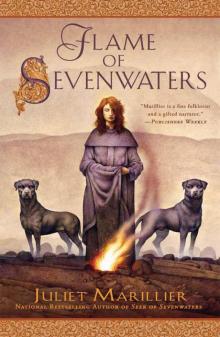 Flame of Sevenwaters
Flame of Sevenwaters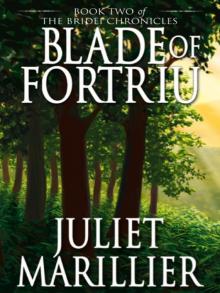 Blade of Fortriu
Blade of Fortriu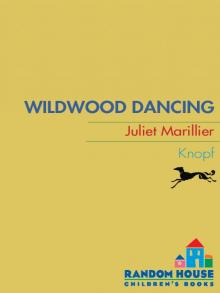 Wildwood Dancing
Wildwood Dancing Dreamer's Pool
Dreamer's Pool Raven Flight
Raven Flight Heir to Sevenwaters
Heir to Sevenwaters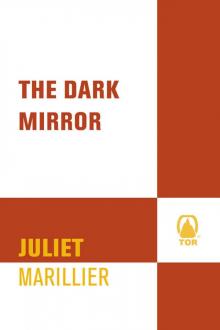 The Dark Mirror
The Dark Mirror Daughter of the Forest
Daughter of the Forest Seer of Sevenwaters
Seer of Sevenwaters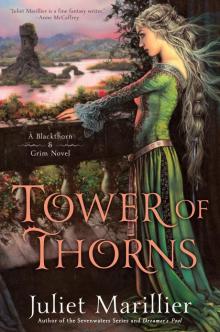 Tower of Thorns
Tower of Thorns Shadowfell
Shadowfell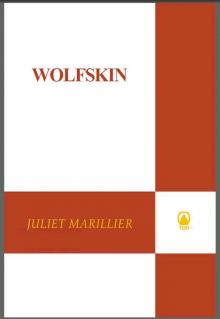 Wolfskin
Wolfskin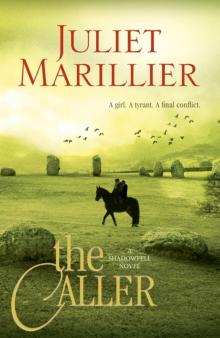 The Caller
The Caller Foxmask
Foxmask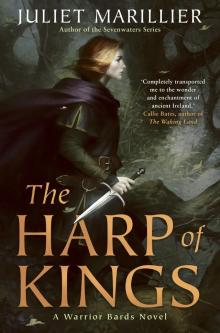 Harp of Kings
Harp of Kings The Well of Shades
The Well of Shades Heart's Blood
Heart's Blood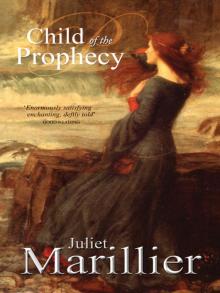 Child of the Prophecy
Child of the Prophecy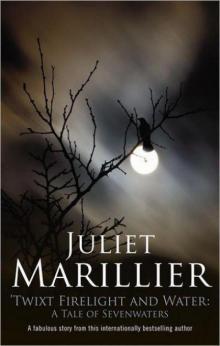 Twixt Firelight and Water
Twixt Firelight and Water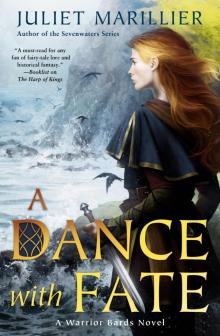 A Dance with Fate
A Dance with Fate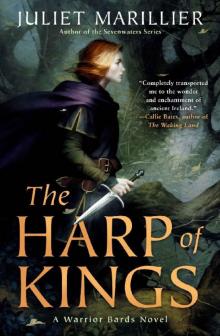 The Harp of Kings (Warrior Bards)
The Harp of Kings (Warrior Bards)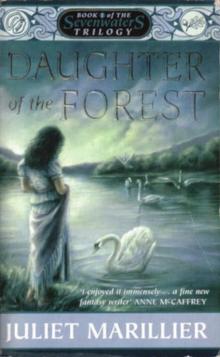 Daughter of the Forest (The Sevenwaters Trilogy)
Daughter of the Forest (The Sevenwaters Trilogy)![Sevenwaters [06] Flame of Sevenwaters Read online](http://i1.bookreadfree.com/i2/04/08/sevenwaters_06_flame_of_sevenwaters_preview.jpg) Sevenwaters [06] Flame of Sevenwaters
Sevenwaters [06] Flame of Sevenwaters![[Sevenwaters 04] Heir to Sevenwaters Read online](http://i1.bookreadfree.com/i2/04/12/sevenwaters_04_heir_to_sevenwaters_preview.jpg) [Sevenwaters 04] Heir to Sevenwaters
[Sevenwaters 04] Heir to Sevenwaters